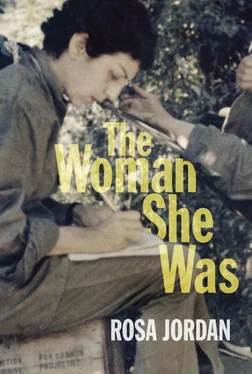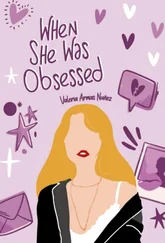Celia’s heart gave a painful thud. She knew that this final gift from Carolina was Liliana’s most precious possession. She would have packed it only if she planned to stay in Miami. Celia reached out and touched the music box. In as neutral a voice as she could muster, she said, “You weren’t intending to come back, were you?”
Liliana deftly moved the music box out of her reach. “No. But you’d have come there, wouldn’t you? After a while?”
“No,” Celia said with quiet finality.
Liliana stared at her, disbelieving. “You wouldn’t? Not ever?”
“Never.”
“Why not?” Liliana almost howled the question.
“Because what I want is here.”
“ Here? ” Liliana pointed at the floor, indicating their small apartment or possibly the whole shabby building below them.
“I mean here in Cuba,” Celia said, surprised by how surprised Liliana seemed. Surely the girl had known! Then retracted “surely” as she recalled that even she had not been positive that she would never go to Miami. Only now was she certain that, although she would have grieved for Liliana as she had grieved for Carolina, she would not have given up her work, her nationality, and her island.
“I like my life here,” Celia said mildly. “What about you? What was it over there that you wanted so much?” She picked up an issue of Granma lying on the bedside table and pretended to scan headlines so Liliana wouldn’t feel she was being grilled.
“Well, the stuff I can’t have here. Like a car. Or even a good bike.”
Inadvertently, both of them glanced toward the music box that, as far as Celia knew, still contained enough cash to buy a nice bike. She thought she saw a flush come to Liliana’s cheeks. Liliana flopped down on the bed next to her and said petulantly, “You don’t make enough money to buy anything and when I’m a doctor I won’t either. It’s not fair .”
“What is not fair?”
“Having to give up some things to get others. Like, if I moved to the States I couldn’t afford to go to medical school. Tío Joe did say he could get me a job, but it wouldn’t be an important job like that .” She thumped the newspaper in Celia’s lap.
Celia looked down. The article was about Operación Milagro, a new program in which hundreds of Cuban doctors were being sent abroad to work in poor countries.
Liliana continued. “Fidel personally shakes their hand when they leave, and everybody tells them what a great thing they’re doing for humanity. They feel proud . At least, I would.” She stared glumly at the ceiling. “But they don’t earn diddly. Tío Joe said even in the States, do-gooder work—that’s what he called it, do-gooder work—is done mostly by volunteers. He said if I wanted to own a car I’d have to take a real job.”
“It sounds like you’ve been thinking about moving to the States for a long time,” Celia ventured.
“For a while,” Liliana said noncommittally.
“What caused you to change your mind?”
Liliana gave her a surely-you-know look. “The hotel getting bombed!”
“Well, yes. But what difference did that make? What did it change?”
Liliana pulled a brown curl into her mouth and held it between pursed lips. It was a moment before she replied, in a dreamy voice, “It’s like all of a sudden I could see myself actually being what I want to be.”
“Which is?”
Liliana let go of the strand of hair and brushed it away from her face with a laugh. “You know. A doctor. Like you.”
• • •
Neither of the Lago brothers contacted Celia in the month following the bombing. Her first inkling that Luis had also been jolted into making a life-defining decision came when Emily Solana telephoned to say she and Luis were engaged and gushingly invited Celia and Liliana to the wedding.
At first Celia worried that Luis’s decision to get married was some kind of rebound behaviour. However, at the wedding reception Emily recounted how they had met during Liliana’s convalescence, and Celia realized with considerable surprise that they had been seeing each other for many months.
Alma, whose looks and personality had changed little in Celia’s memory, flitted among wedding guests looking more like a woman in her forties than one in her sixties. Unselfconsciously, she repeatedly thanked God for protecting her family and bestowing this blessing: the marriage of a son and promises from her new daughter-in-law that she would soon be surrounded by grandchildren.
Liliana, who regularly visited the Lagos, had passed on to Celia the news that the couple had moved in with Alma. As a wedding present José had given them a king-sized bed to replace the two broken-down single beds that had furnished the brothers’ room for as long as anyone could remember. He had rented an apartment for himself near Hotel Palco and had not called Celia or stopped by since the hotel bombing. She wondered, watching him work his way through the wedding guests toward her, whether it had a noticeable effect on him too.
Apparently something had changed because when they were finally face to face, he barely acknowledged her, and instead, addressed Liliana. “I wonder if you’d mind helping me out with the car?” he said abruptly.
“The car?” Liliana looked as puzzled as Celia felt.
“There’s no parking at my new place and I hate leaving it at Mother’s when I’m out of the country. If you’d learn to drive you could use it when I’m not here.”
Celia supposed this was his way of apologizing to Liliana for having got so angry with her the night of the bombing. But she also sensed that it was another attempt on his part to keep her in his orbit and instantly protested.
“No, I don’t think—”
José interrupted. “Celia, for God’s sake. It’s the twenty-first century. Driving is a skill she needs, and Alma’s perfectly capable of teaching her.”
Liliana laid a hand on José’s sleeve. “Really, Tío? When can we start?”
“All right.” Celia grudgingly offered the consent that neither of them had bothered to seek. “But leave me out of it. Whatever you decide is between you two.”
• • •
Driving lessons began almost immediately, and by fall Alma pronounced Liliana a competent driver. José presented Liliana with a credit card issued in her name by a Mexican bank, along with a stern warning that its use for anything other than gas would cause her driving privileges to be revoked. After that Celia could hardly deny Liliana the right to practise when the car was available. However, she drew a line at Liliana running around in a convertible loaded with other teens. Her solution was to work straight through during the three weeks each month that Liliana was at school, and then take off work the week Liliana was on break. If José was in Miami and they happened to have the car, she would let Liliana pick a place on the island to visit and they would drive there, Liliana at the wheel.
All José asked was that Liliana drop him at the airport when he left and pick him up on his return—unless she was in school, in which case Alma performed the service. José told Celia he liked the convenience. Liliana told Celia that what Tío Joe really liked was not having to take a taxi like an ordinary traveller, but being picked up by “a classy chica in a classy máquina.”
Celia smiled at Liliana’s description of herself as a “classy chica,” and mused that José might have been less pleased with the arrangement if he knew that Liliana relished details of his personal life and loved sharing them with Celia, Emily, and Alma.
“I found a woman’s shoe in the car,” Liliana would exclaim. “And it’s not the same size as the pair left in the car last month. Are these women so sprung on him that they forget they got in the car wearing shoes? Or leave them on purpose so he’ll see how worn out they are and buy them a new pair?”
Читать дальше












